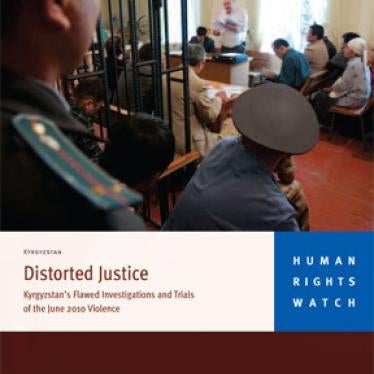(New York) – The Kyrgyz authorities should immediately open a criminal investigation into a series of violent assaults on a lawyer defending an ethnic Uzbek on trial in relation to the 2010 ethnic violence, Human Rights Watch said today. The Kyrgyz government has a duty to adequately safeguard the safety of lawyers if their security is threatened as a result of doing their legitimate job.
In the most recent incident, on August 2, 2011, four women physically attacked the lawyer, Tatyana Tomina, at the Osh City Court. It was the fourth time in 10 months that Tomina has been violently attacked for representing clients facing charges relating to the 2010 violence. In addition, victims’ relatives and a group of women who support them have verbally attacked her repeatedly.
“We are profoundly concerned for Tomina’s safety,” said Hugh Williamson, Europe and Central Asia director at Human Rights Watch. “This attack recalls last year’s string of assaults on lawyers, and the government’s consistent failure to investigate and punish those responsible has only emboldened the attackers.”
Tomina told Human Rights Watch that she was about to leave the court building on August 2 because her client’s hearing had been rescheduled, when the women started beating her in the presence of the court employees, visitors, and several convoy police officers. One of the attackers hit Tomina hard with a heavy bag, and then the others punched and kicked her.
A judge approached to see what was happening, but instead of stopping the violence, he quickly retreated into his office. Court clerks who had just spoken with Tomina ignored the attack and made no move to stop it. One of Tomina’s colleagues tried to protect her but could not overcome the attackers.
The women ripped Tomina’s briefcase with case materials from her hands, yelled that she was a “defender of murderers,” “sell-out,” and “prostitute,” and threatened her with more physical violence. Finally, one of the convoy police officers intervened and told the women to leave the building. Before leaving, the attackers threw several stones at Tomina, though they missed her.
Later that day, a Human Rights Watch researcher witnessed the same group of women verbally attacking Tomina at the Osh pretrial detention facility, where she was to attend a hearing for another ethnic Uzbek client charged with a crime unrelated to the June 2010 violence. Police officers who were there did very little to stop the verbal abuse.
Another recent incident highlights the threats to Tomina’s security and her ability to represent clients. On August 3, Tomina went to the Osh City Police Department because a client, an ethnic Uzbek who was a suspect in a crime unrelated to the 2010 violence, was in a police line-up. The victim’s relatives began verbally attacking Tomina, with one of them threatening, “You will not live to see this case to go to court” and “I will kill you!” When Tomina tried to get the attention of an investigator who was witnessing the threats, he told her, “It’s not our [police] problem.”
“The attacks on lawyers began last year in the context of the June violence, but now they’ve spread to other cases,” Williamson said. “It is a shocking catalogue of unpunished violence.”
On September 2, 2010, during a hearing of the trial against a human rights defender, Azimjon Askarov, and another seven defendants on charges connected to the June violence in the Bazar-Kurgan District Court, a violent crowd of victims’ relatives threw a water glass at the cage that held the defendants. The glass shattered in front of Tomina, and one of the pieces hit her shoulder. A Human Rights Watch researcher witnessed the incident, as well as verbal threats of physical violence directed at the defense lawyers. While many police were present in the courtroom, no one tried to subdue the violent crowd.
In another incident, on October 13, 2010, a group of relatives of two ethnic Kyrgyz traffic police officers killed in June 2010 attacked Tomina and another lawyer, as well as one of the defendants and his relatives in front of Osh Military Unit 7703, where the trial was supposed to take place. Soldiers and police officers at the scene did little to stop the attackers, who broke one man’s ribs and punched and kicked Tomina and her colleague.
Tomina filed a complaint the same day with the Osh City Prosecutor’s Office, but no investigation followed, though numerous people witnessed the attack, including police officers, and the attackers were never held responsible. The same people threatened Tomina at the appeal hearing at the Supreme Court in Bishkek on May 10, 2011. The authorities have taken no steps to ensure Tomina’s security, and she has continued to work in constant anticipation of further attacks.
Articles 318-1 and 320 of the Kyrgyz Criminal Code stipulate that obstructing in any form the realization of a lawyer’s professional duties and using violence or threatening a lawyer with violence are criminal acts under national law.
Under the UN Basic Principles on the Role of Lawyers, the Kyrgyz government has a duty to ensure that lawyers can carry out their work without intimidation, hindrance, or harassment and take immediate action to provide protection if a lawyer’s security is threatened as a result of professional activities.
Kyrgyz authorities should investigate the attacks, see that those responsible are held accountable, and provide effective protection for Tomina and other lawyers when their safety is jeopardized as a result of their work, Human Rights Watch said.
“The grief of victims’ families is understandable but in no way justifies violence against defense lawyers and inaction by the Kyrgyz law enforcement officials,” Williamson said. “The law enforcement authorities’ neglect of their duty makes these lawyers an easy target. Law enforcement needs to do its job, stop the attacks, and investigate and punish those responsible.”







